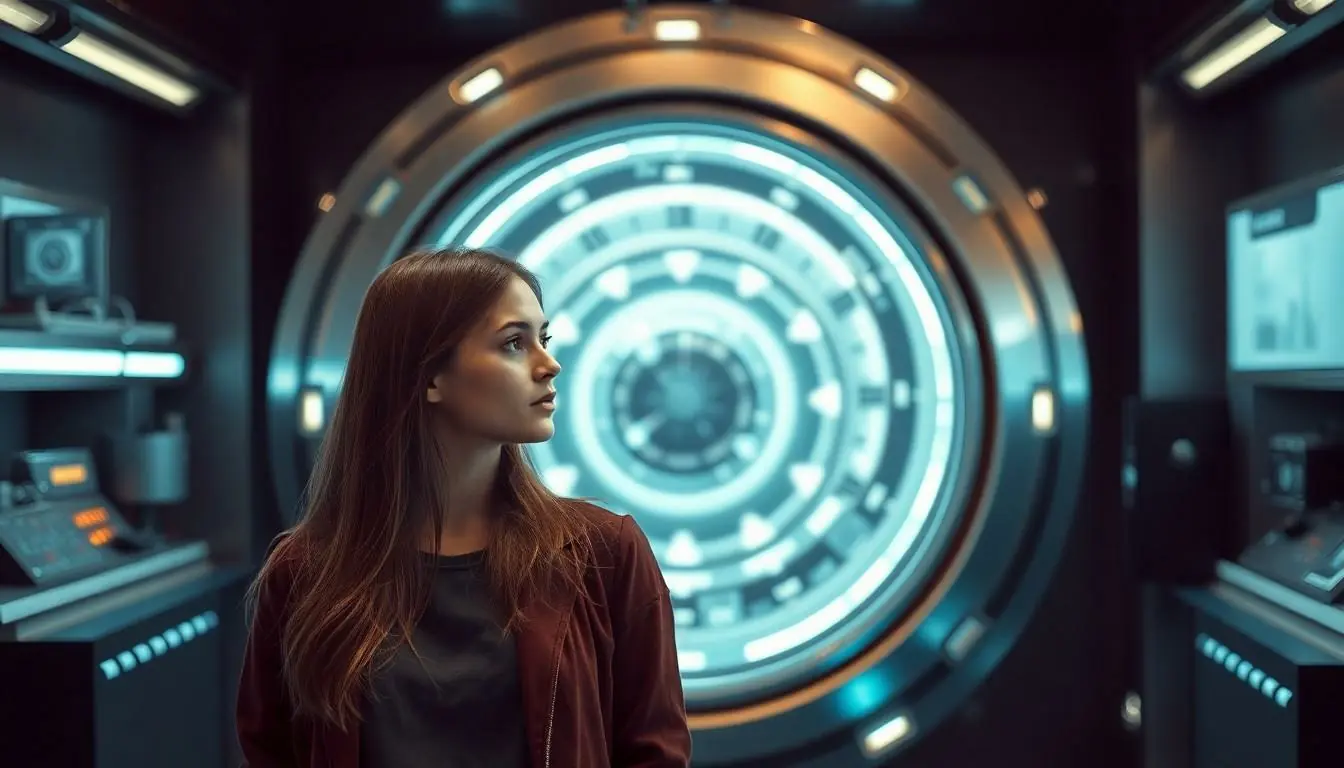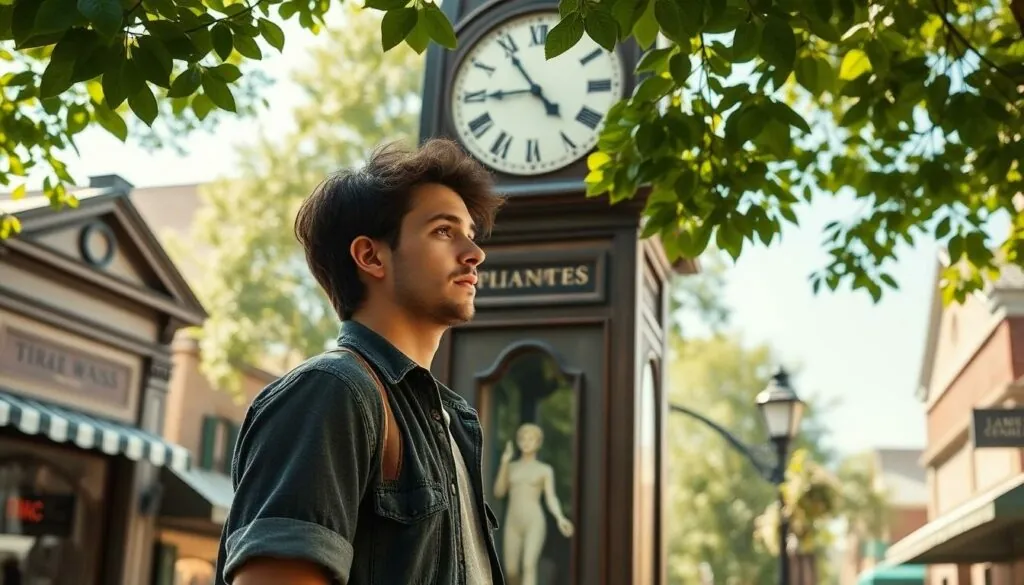Time travel movies have a unique charm that pulls viewers into a whirlwind of adventure, nostalgia, and sometimes, a little confusion. Who hasn’t daydreamed about hopping into a DeLorean or a TARDIS to rewrite their own history or snag a glimpse of the future? These films not only tickle the imagination but also challenge our understanding of time itself.
Table of Contents
ToggleOverview of Time Travel Movies
Time travel movies explore complex narratives that challenge viewers’ perceptions of reality. These films often revolve around characters who encounter methods to traverse time, whether through machines, magical elements, or scientific phenomena. Notable titles such as “Back to the Future” utilize comedic elements alongside adventure, showcasing the implications of altering past events.
Many stories focus on characters’ quests to correct wrongs or fulfill destinies. “The Terminator” presents a darker take on time travel, featuring consequences that arise from tampering with time. Action-packed moments highlight the urgency and stakes involved, revealing the impact of technology on the timeline.
Films like “Interstellar” delve into intricate theories of relativity and the effects of gravity on time. Characters navigate through space and time, examining emotional themes alongside scientific concepts. Engaging visuals enhance the experience, drawing audiences into the fantastical realms of time travel.
In addition, narratives explore moral dilemmas faced by time travelers. Movies such as “Predestination” examine identity and fate’s implications, leaving viewers questioning their notions of free will. These films provoke deep thought about choices and their ripple effects across timelines.
Overall, time travel movies maintain a universal appeal thanks to their blend of adventure, romance, or suspense. They captivate audiences by inviting them to ponder various aspects of time, from its linear nature to paradoxes that arise from changing events. Such vivid storytelling resonates with viewers, making time travel an enduring subject in cinema.
Key Elements of a Movie About Time Travel

Time travel movies incorporate several crucial elements that create engaging narratives. These components intertwine to capture audience interest and provoke deep thought about time itself.
Plot Devices
Time travel films utilize diverse plot devices that enhance storytelling. These narratives often feature timelines that branch or converge, presenting alternate realities. Flashbacks or flash-forwards serve as effective tools to illustrate the impact of choices. Devices like time machines or cosmic events trigger characters’ journeys into the past or future. Some stories explore paradoxes, raising questions about cause and effect. Films may also introduce “rules” governing time travel, giving structure to the plot. These elements provide exciting twists that keep viewers engaged while contemplating the consequences of each action.
Character Development
Character development plays a vital role in time travel narratives. Protagonists often undergo significant transformations due to their experiences across different time periods. They face moral dilemmas, forcing them to reevaluate their values and beliefs. Relationships with other characters deepen as time travelers confront their past actions and future possibilities. Inner struggles and growth create a relatable connection to the audience. Vulnerability often surfaces, portraying human nature’s complexities. These growth arcs not only entertain but also challenge viewers to reflect on their choices and their potential impact on their lives.
Notable Movies About Time Travel
Time travel movies offer a captivating glimpse into narratives that challenge perceptions of time and reality. Several films have carved their names in this genre, spanning both classic and modern interpretations.
Classic Films
“Back to the Future” remains a staple in the time travel genre. This film combines humor with the adventure of a teenager who accidentally travels to the past, disrupting his own timeline. “The Time Machine,” adapted from H.G. Wells’ novel, presents a thought-provoking exploration of future societies and the consequences of technological advancements. “12 Monkeys,” a gripping tale of a dystopian future, tracks a man sent back in time to prevent a devastating plague. These classic titles laid the foundation for time travel’s cinematic appeal.
Modern Interpretations
Modern films have taken unique approaches to time travel. “Interstellar” intricately weaves scientific theories into an emotional narrative, showcasing the bond between a father and daughter separated by time. “Looper” offers a gritty perspective, where assassins eliminate targets sent back from the future, complicating personal relationships. “Edge of Tomorrow” introduces a blend of action and humor, featuring a soldier reliving the same day in a battle against alien invaders. These contemporary films continue to engage audiences, expanding the thematic bounds of time travel.
The Impact of Time Travel on Storytelling
Time travel significantly influences storytelling in cinema. Complex narratives arise from the twists and turns of traveling across time. Enhancements in plot devices, including branching timelines and flashbacks, engage audiences and keep them on their toes. Emotional arcs often accompany these narratives, leading protagonists to confront moral dilemmas that reflect viewers’ own choices.
Characters evolve as they navigate the repercussions of their time-altering actions. In films like “Predestination,” identity issues emerge, challenging perceptions of free will. Themes of sacrifice and redemption take center stage, emphasizing relationships that deepen through shared experiences across different timelines.
The exploration of time travel prompts filmmakers to push creative boundaries. Innovative narratives in modern films such as “Interstellar” and “Looper” expand thematic possibilities, integrating scientific theories with emotional depth. Classic movies like “Back to the Future” set the stage for these explorations, establishing a foundation that continues to inspire new works.
Audiences often ponder the consequences of time travel on personal history and future outcomes. Reflection on choices becomes a universal theme, creating connections to viewers’ lives. Moreover, the tension between destiny and free will resonates across various time travel narratives, enriching the storytelling experience.
By blending genres such as adventure, romance, and suspense, filmmakers enhance the allure of time travel films. These elements invite deeper contemplation of time’s role in shaping human experiences and decision-making. Overall, time travel remains a powerful storytelling tool that captivates both the imagination and intellect, ensuring its lasting appeal.
Time travel movies continue to fascinate audiences with their blend of adventure and emotional depth. They challenge perceptions of reality while exploring the intricate relationship between time and human choices. As filmmakers push creative boundaries and delve into complex narratives, these films invite viewers to reflect on their own lives and the consequences of their decisions.
Whether through classic titles or modern interpretations, the genre remains a powerful medium for storytelling. It captivates the imagination and encourages contemplation of time’s profound impact on personal history and future possibilities. The enduring appeal of time travel films ensures they’ll remain a significant part of cinematic exploration for years to come.





